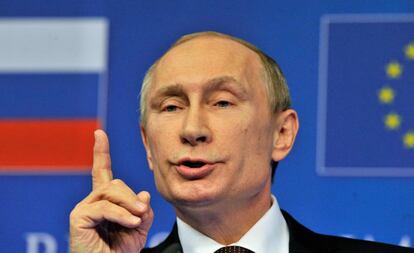An anti-European European parliament
Russia could intervene decisively in the elections next year via social networks

Europe seems little alarmed before the – very real – possibility of having an anti-European parliament within a year. Up to now, it had been purely incidental that Eurosceptics such as Nigel Farage or Marine Le Pen occupied seats in the European parliament. But in the May 2019 elections, left- and right-wing populists, under the auspices of Russia, may form a block that will guarantee five years of chaos in Brussels. Meanwhile, Moscow has seen the great opportunities presented by such chaos. Its technological apparatus of interference has helped to destabilize, among others, the United Kingdom of Brexit, the Italy of the Northern League, and the Spain of the Catalan pro-independence crisis. It was crucial for Vladimir Putin’s recent electoral victory that he was able to show that, after all, things are not so bad in Russia, considering the situation in Europe and the United States.
In the May 2019 elections, left- and right-wing populists, under the auspices of Russia, may form a block that will guarantee five years of chaos in Brussels
Despite the clear signs of Russian disinformation activity across the continent, the European Commission is reluctant to legislate for the protection of the hitherto sacred exercise of free elections. And nothing, absolutely nothing seems to indicate that the Kremlin will miss the opportunity to bring chaos to Brussels. It would be Putin’s greatest victory against Western values.
This is not just about fake news. The problem is much broader and serious. Bad headlines and manipulation have always existed. The problem is the scale of it. Today, lies are circulated in industrial quantities, by using technology to manipulate the algorithms of social media and deceive citizens by means of an alternative reality of exacerbated problems in need of radical measures. Russian media have portrayed Italy and Germany as countries overwhelmed by the crimes of refugees, the United Kingdom as a nation ruthlessly devoured by Brussels, and Spain as an authoritarian state that has invalidated the unanimous will of all Catalans.
All these lies were gathered by Kremlin-funded media such as RT or Sputnik through methods of doubtful journalistic ethics. Their messages were subsequently amplified through the interaction of hundreds of thousands of inactive accounts on social media, activated for every campaign that suits the Kremlin. They are taking advantage of the fact that Europeans do not get information mainly from newspapers, radio or television, but rather through their cellphones. On the internet, those Russian media compete without hindrance and in equal conditions with the most respected newspapers, which are accustomed to fact checking and accountability.
Russian media have portrayed Spain as an authoritarian state that has invalidated the unanimous will of all Catalans
So far, only the Commissioner for the Digital Economy and Society, the Bulgarian Mariya Gabriel, has taken measures. She has assigned a group of independent experts to elaborate a report and will formulate a series of recommendations by the end of this month. The Commissioner herself has suggested that technological platforms need to be more transparent regarding their algorithms, without harming their rights to intellectual property. For the time being, however, she lacks the necessary support, within and outside the Commission, to ratify binding measures that go beyond recommendations and educational programs.
What kind of measures are we talking about? Undoubtedly, disinformation, no matter how pernicious, is not necessarily illegal. This is a complex terrain, in which it is necessary to preserve freedom of speech and opinion. But more transparency is required. Here are a few ideas.
Platforms must know if they are being manipulated to make fake information go viral and must report it to the electoral authorities
First, the Kremlin’s agitation media should be identified as such, as they are in the United States. Second, platforms must know if they are being manipulated to make fake information go viral and must report it to the electoral authorities. Third, these companies must be less opaque and allow for wider access to their app programming interface, which is something that helps us as media to recognize ill-intentioned manipulation. And fourth, the larger social media and digital platforms must be as responsible for the content they publish as the mainstream media.
The European Commission has proved that it is capable of approving measures in this area. A new Data Protection Regulation, passed in 2015, will take effect on May 25. It will significantly restrict the kind of information that social media and other Internet platforms can store. If the Commission, the Council and the Parliament were able to reach an agreement on new privacy rules for technological companies, why not do the same to prevent these companies from being used to harm directly the foundations of democracy in its very birthplace?









































